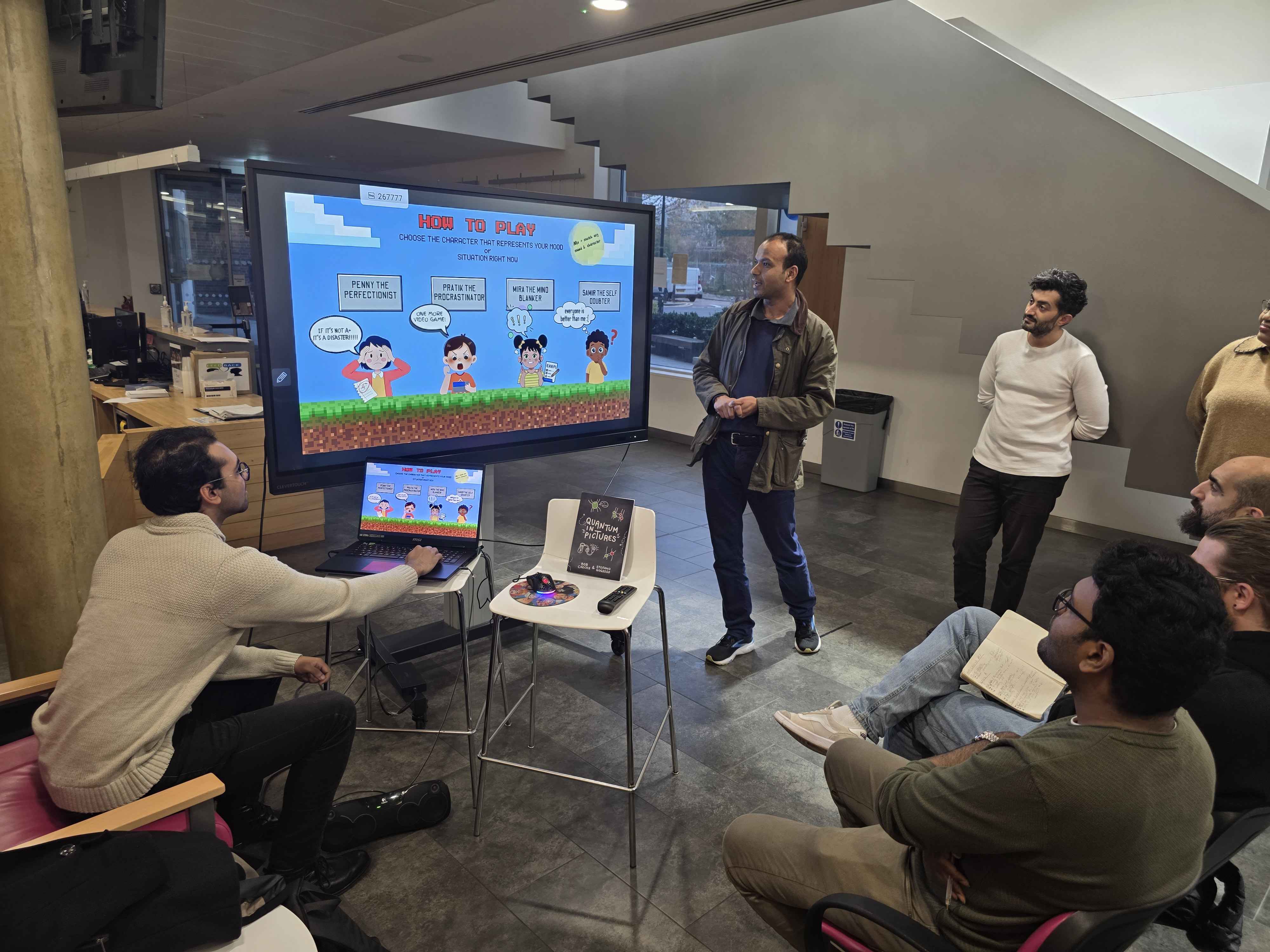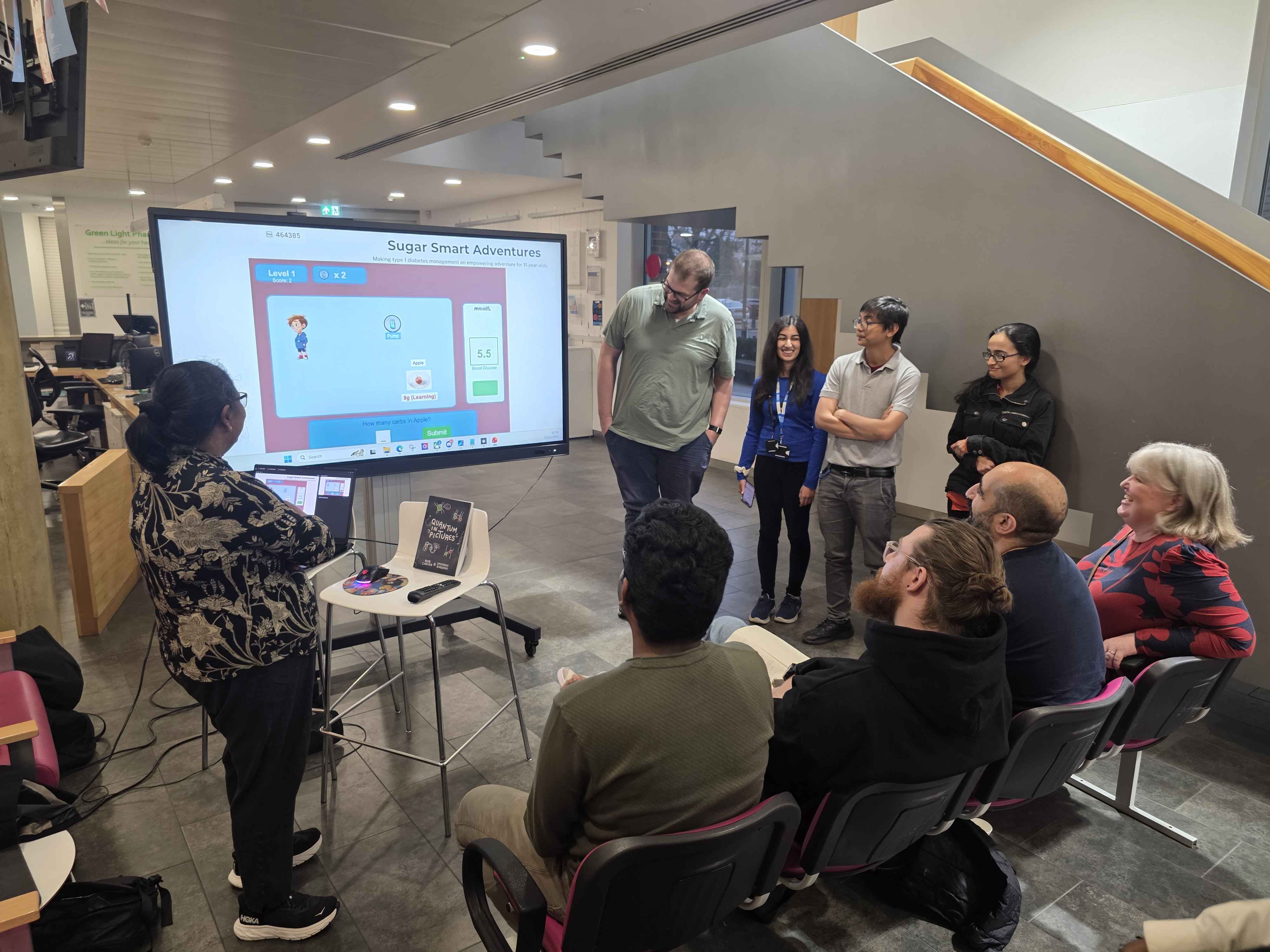Inside the 2025 Clinical Game Jam London
In November 2025, St Andrews Health Centre in London hosted one of the most forward-thinking events in UK digital health: the Second Clinical Game Jam, supported by Rosebud as a major sponsor. The event united clinicians, students, designers, developers, and researchers under an ambitious mission:
“Build games that tackle real health inequalities facing children and young people in the NHS.”
By the end of an intense, collaborative weekend, four teams produced four complete game prototypes—each addressing a measurable and urgent challenge within NHS child health services:
- Puff Puff – A playful asthma-awareness and self-management adventure
- Speech Assistant – A game supporting children on long waiting lists for speech and language therapy (and the winner of the jam)
- Thrive Quest – A mental-health regulation mini-game toolkit for teens
- Sugar Smart Adventures – An interactive learning game for children with type 1 diabetes
Together, these games offer a glimpse into the near future of digital therapeutics: accessible, evidence-informed, personalised, and designed with the communities they aim to serve.

Why the NHS Needs Game-Based Interventions More Than Ever
Across the UK, child health inequalities are widening:
- Asthma admissions remain one of the top causes of paediatric emergency attendance.
- Nearly 100,000 children are waiting for speech and language therapy (SALT) support.
- Teen mental health crises are rising, with anxiety and stress touching almost every classroom.
- Children with type 1 diabetes face daily, cognitively demanding decisions about food, carbs, insulin, and safety.
The Clinical Game Jam model brings something precious into this landscape:
rapid prototyping, real-world clinician oversight, and the playful problem-solving mindset of game development.
Every team tackled a problem rooted in everyday NHS pressures and turned it into an interactive experience children would actually want to use.
Puff Puff — Turning Asthma Education into an Adventure
Puff Puff reimagines asthma learning as an upbeat, child-led journey through the lungs. Designed for ages 5–10, the game lets children customise their character, pick a favourite companion, and step into a world where airways narrow, widen, and respond to the tools they use. Instead of passively hearing about inhalers or triggers, children experience them: energy dips when airways constrict, breathing tools open up new paths, and familiar asthma-management techniques become intuitive reactions as they play.
What makes Puff Puff stand out is how effortlessly it blends clinical accuracy with fun. Asthma action plans aren’t presented as instructions but woven into challenges and rewards. Real-life follow-up appointments earn tokens, turning healthy behaviour into an ongoing story. For many children, this is the first time asthma feels not frightening or abstract, but knowable and even empowering.
Speech Assistant — The Game Jam Winner Tackling a National Waiting List
Built by Aidan Goodall, Priyanka Naik, Dr Tharshni U., and Nidhi Parekh, Speech Assistant responds to one of the NHS’s most urgent child-health inequalities: the tens of thousands of children waiting for speech and language therapy. The team’s starting point was simple but powerful: if children are stuck waiting, how can we help them “wait well”?
The result is a warm, child-friendly game that mirrors the flow of a typical SALT pathway. Children begin with a quick assessment phase, then move into playful speech exercises, identifying objects from sounds, practising words, and constructing simple stories while voice-recognition technology offers gentle, real-time guidance. Everything is designed to feel safe, encouraging, and low-pressure: speaking to animals on a virtual farm, exploring environments that adapt to skill level, and building confidence one tiny win at a time.
What clinched the win for Speech Assistant was its holistic vision. The game doesn’t replace therapists; it complements them, giving teachers, parents, and clinicians a shared tool to track progress and reduce anxiety during long waits. It’s a model that could scale nationally and quickly.
Thrive Quest — Helping Teens Build Emotional Regulation Through Play

Thrive Quest tackles a different kind of inequality: the hidden emotional load teenagers carry daily: exam fear, friendship tension, bullying, pressure to belong. Rather than offering heavy-handed advice or clinical language, the game gives teens a fast, visually engaging way to steady their thoughts in moments of stress.
Its design is rooted in research on visuospatial tasks, which are known to interrupt spiralling thoughts and reduce emotional overwhelm. In the game, players face short scenarios inspired by real teenage experiences, each paired with a quick-paced visual challenge that redirects attention and creates mental breathing room. The tone is supportive, never patronising. The game simply meets young people where they are: on their phones, between classes, in moments when a breathing exercise or worksheet would be ignored.
Thrive Quest isn’t positioned as a mental health intervention in the clinical sense but as a discreet, stigma-free companion. It gives teens a few seconds of regulation when they need it most, which for many is already a meaningful step toward resilience.
Sugar Smart Adventures — Making Carb Counting Click for Children with Type 1 Diabetes

Carbohydrate counting is one of the hardest skills for children with type 1 diabetes to master, yet it’s fundamental to safe, confident self-management. Sugar Smart Adventures reframes this daily challenge as an interactive global food journey where children estimate carbs in different dishes, test their decisions with instant feedback, and gradually build intuitive knowledge through repetition.
What elevates the experience is its realism: portions aren’t idealised textbook images but the kinds of servings children actually encounter: half slices of pizza, variable portions of rice, foods from different cultures and family traditions. A dynamic glucose meter reflects the child’s choices moment to moment, turning abstract nutritional rules into lived experience.
The tone stays playful throughout, with expressive characters, gentle rewards, and progressive difficulty that keeps young players engaged. Behind the charm sits a clinically rigorous structure informed by paediatric diabetes teams. The goal isn’t to gamify diabetes, but to transform confident carb estimation from something children fear getting wrong into something they simply get better at each day.
What This Game Jam Proved
The London Clinical Game Jam wasn’t just a creative weekend; it was a living demonstration of a new model for NHS innovation:
1. Clinicians + Creators Build Faster Together
The prototypes built in 48 hours represent months of traditional development.
2. Child Health Inequalities Need Playful Solutions
Complex literacy barriers, anxiety, and motivation issues often block engagement. Games bypass them.
3. Evidence-Based Design Works Best When Co-Designed
Each team integrated clinical insight directly into mechanics, storylines, safety, and progression.
4. Small Teams Can Address Big Systemic Problems
Waiting lists, self-management gaps, school-based mental health needs, and chronic disease education are enormous challenges.
Yet four small teams produced meaningful, scalable prototypes that offer real pathways to impact.
The Future of Clinical Game Development in the NHS
As game-based interventions gain traction, events like the Clinical Game Jam highlight what is possible:
- Rapid prototyping of digital therapeutics
- Patient-centred design embedded from day one
- Educational gameplay that builds real-world skills
- Safer, child-friendly environments for practicing health behaviours
- Multidisciplinary teams that reflect the complexity of modern healthcare challenges
With future iterations and growing partnerships between NHS clinicians, universities, industry sponsors like Rosebud, and young innovators, the UK could quickly establish itself as a leading hub for evidence-informed health games.
Closing Thoughts
The Second Clinical Game Jam London didn’t just produce four games.
It produced four blueprints for how interactive, accessible, joyful design can reshape paediatric healthcare.
From breathing through narrowed airways to practicing speech with virtual farm animals, from confronting anxiety through visual puzzles to estimating carbs in a global food tour, these prototypes show what the future of child health interventions could look like:
Personalised, playful, clinically grounded, and built for the realities children face today.
👉 Want to explore how vibe coding could bring your own healthcare idea to life?
Start creating today at rosebud.ai.








.png)
